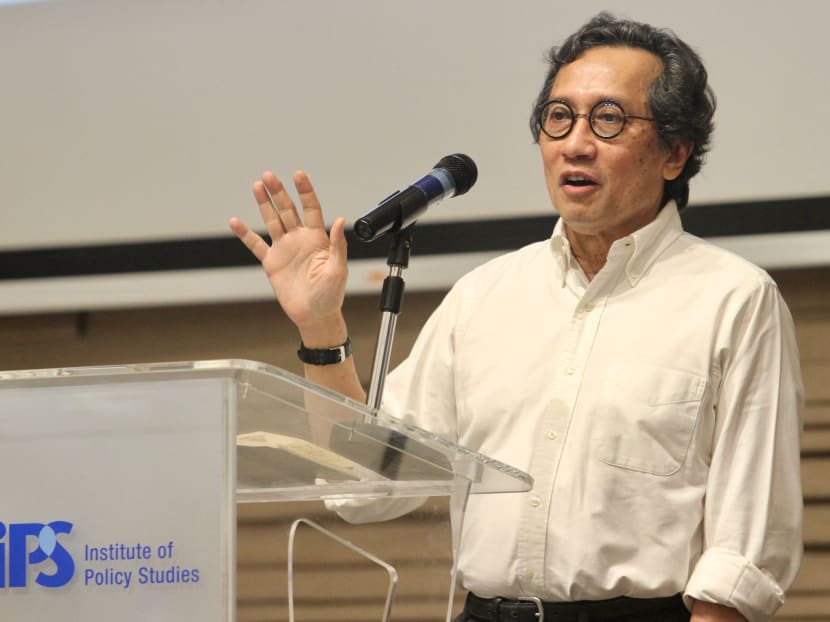Do a better job with national education: Bilahari Kausikan
SINGAPORE – The Republic does a "bad job" with its national education, declared former permanent secretary of foreign affairs Bilahari Kausikan on Thursday (July 19) as he stressed the need for Singaporeans to be aware of foreign influence exerted on the Singaporean identity.

Mr Bilahari Kausikan, Chairman of the Middle East Institute and former Ambassador-at-Large at the Ministry of Foreign Affairs, speaks at the IPSA-OnePeople.sg Forum on Ethnic Identity and Culture on July 19, 2018.
SINGAPORE – The Republic does a "bad job" with its national education, declared former permanent secretary of foreign affairs Bilahari Kausikan on Thursday (July 19) as he stressed the need for Singaporeans to be aware of foreign influence exerted on the Singaporean identity.
Speaking at a forum on ethnic identity and culture, Mr Kausikan was responding to a question on how new immigrants can better understand Singapore.
"I have said this many times, I think we do a really bad job on national education for a start… Forget about immigrants and things like that, among Singaporeans, also, we do a very bad job of national education," he said.
National education here is "very formalistic" and Singapore also made the "fundamental mistake" of de-emphasising the study of history in schools, he said at the forum hosted by the Institute of Policy Studies and OnePeople.sg at The Grassroots' Club.
For new permanent residents and citizens, Singapore can do a much better job of telling them "certain basic things about Singapore", he said.
"Whether it will take root or not, who knows... But you can at least do a better job of conveying certain things," he added without elaborating.
The current generation of Singaporeans will have to deal with the effects of social media on the national identity and the echo chamber effect it creates, he said.
Social media has changed, for instance, the nature of immigration where people "never really leave" the country. "You really never leave any country, you bring your country with you, you create little pockets of your country all over the place," he said.
Since people cannot unlearn the technology or cut themselves off from social media, they will have to be aware of the downsides of relying on social media.
Such awareness is also the best defence against foreign powers trying to exert their influence here, he said, adding that such attempts can be spontaneous and not as obvious as in other countries.
"(And) you have to talk about it, particularly when there are deliberate attempts to manipulate your mind to accept a particular identity, because once you are aware that this is happening, I think you become less vulnerable," he added.
In his opening remarks at the forum, Mr Kausikan spoke about Singapore's "malleable" identity that is subject to forces that are trying to pull Singapore apart.
His view – also expressed in recent speaking engagements – is that the Chinese, for instance, are trying to exert their Chinese identity on a multi-racial Singapore through methods including persuasion, inducement and coercion.
In response to his remarks last week at a conference organised by OCBC, Chinese Ambassador to Singapore Hong Xiaoyong said Mr Kausikan looks at China "through biased eyes" and that China opposes interference in others' internal affairs.
On Thursday, Mr Kausikan also referred to academic Huang Jing, who was with the Lee Kuan Yew School of Public Policy until his permanent residency was cancelled last year, after he was identified by the Singapore Government as an "agent of influence".
The authorities said he had used his position to "deliberately and covertly advance the agenda of a foreign country at Singapore's expense".
While such issues are difficult to deal with, the authorities took action by expelling Dr Huang, he said.
Such a move "does work" in sending a message to others, said Mr Kausikan. "And I think it is the greatest foreign policy challenge that we face."
Touching briefly about Malaysia, he said that the recent election results meant a change in government but not its system. The demographics of a falling Chinese population are working against the non-Malays, he said.
"Do you think Dr Mahathir (Mohamad) is going to say, 'okay, I was wrong, no more bumiputera privileges'? He may tamper with it on the edge, and he tried the last time… but he failed," said Mr Kausikan.
"Incidentally, Mahathir can be a bit irritating from time to time, with the water thing and so on, but without him, their whole system is going to fall apart. He's holding it together."
Dr Mahathir, the Malaysian Prime Minister, recently revived the water issue between Singapore and Malaysia and said the price of water being sold to Singapore was "ridiculous".
Singapore's Ministry of Foreign Affairs responded and said both sides have to fully comply with the 1962 agreement, which expires in 2061.
Singapore may draw 250 million gallons of raw water from the Johor River daily at 3 sen (1.01 Singapore cents) per thousand gallons. In return, Johor is entitled to receive a daily supply of up to five million gallons of treated water - or 2 per cent of the water supplied to Singapore - at 50 sen per 1,000 gallons.






